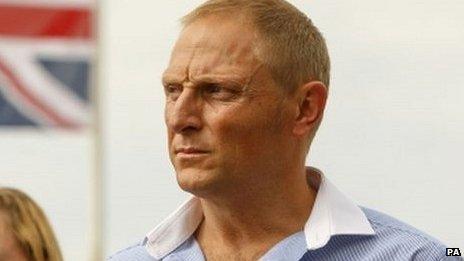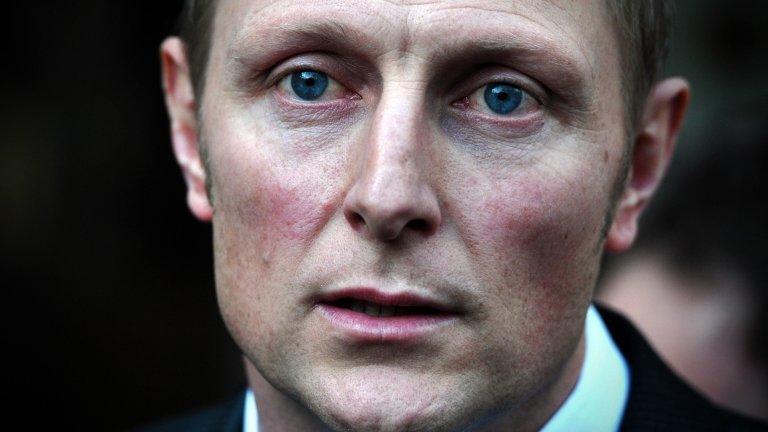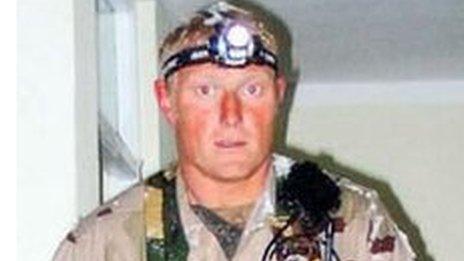Danny Nightingale: SAS man who will not stop fighting
- Published
- comments

Danny Nightingale is now faced with a difficult choice over whether to appeal
Back in 2005, after an RAF flight back from Iraq shared with A Squadron of 22 SAS (the British Army's regular Special Forces regiment), I got a small insight into the processes surrounding weapons and how they were not always obeyed to the letter.
Arriving at RAF Brize Norton one of the squadron's grizzled NCO's sidled up to a customs man and said: "We've got three GPMGs that aren't on the manifest. That's not a problem is it?"
I thought it was a telling revelation - the weapons, General Purpose Machine Guns, are high powered items that could cause carnage in the wrong hands.
The Customs man was unconcerned though, some scribbles were made on a clipboard and the A Squadron guys, who in contrast to the rest of the military on the flight were wearing civilian clothes, picked up their holdalls and boarded their coach back to Hereford.
One might think it was one small example of the SAS playing fast and loose with strict rules concerning weapons shipments, exploiting the kind of latitude it enjoys as an elite formation, something that often irks other members of the forces.
Or you might see it as evidence that even "the Regiment", coming back from an operational tour in Iraq, knew that the paperwork had to be done properly and were belatedly putting things right with customs because they knew they had to.
Talking to Sgt Danny Nightingale, an SAS soldier found guilty of illegally possessing a gun and ammunition, he objects to the idea that things were ever played fast and loose in A Squadron:
"You signed everything in," he says, referring to the paperwork completed at armouries, "and you signed everything out".
Yet despite, he insists, adhering to these procedures he was convicted on Wednesday of possessing a Glock pistol and hundreds of rounds of ammunition. He has yet to be sentenced and is deciding whether to appeal the verdict delivered at Bulford Military Court.
It is the second time he has been convicted - the first was quashed after a campaign by Sgt Nightingale's wife Sally. Some have detected in the decision to proceed a second time, a vendetta on the part of the military to get even after the public outcry at his first conviction.
He says he is being made an example of to show that bringing unauthorised weapons back from operational tours can never be sanctioned, and that this rule applies to the SAS as well as everyone else.
Some have detected in the MoD's zeal to proceed against the sergeant evidence of a wider drive on the part of ministers and civil servants to cut the Special Forces down to size again after 12 years in which they have engaged in high tempo operations, enjoying considerable autonomy as well as kudos.
In deciding to speak to Newsnight and some other media outlets today, Sgt Nightingale acknowledges that as a still serving member of the SAS, he may cause further upset at the MoD, but is determined to prove his innocence.
His quest has been made all the harder by the police interview he gave after the weapon was found at his home two years ago in which he admitted bringing it back from Iraq as a war trophy.
Today he says that he has no recollection of bringing it back but was simply going along with what colleagues told him must be the explanation, his own memory having been damaged after collapsing after a marathon in the Amazon, suffering seizures and brain damage.
Although Sgt Nightingale acknowledges there was a widespread practice of bringing back trophies - that were then de-commissioned so that they were safe before being mounted on plaques or presented as gifts - he says he has absolutely no memory of receiving the Glock pistol nor did it show any trace of his fingerprints or DNA.
Another SAS soldier who he shared the house with has already been disciplined for possessing a similar undeclared pistol.
Where does the sergeant go from here? He says that an appeal, if lost, might mean financial ruin for himself and his wider family. Why not just take the sentence, I ask? And it is clear that this is precisely the kind of awful choice that he is now trying to make.
- Published25 July 2013

- Published10 July 2013
